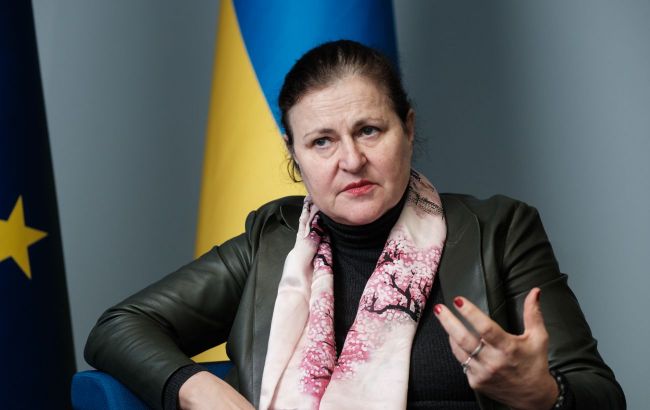EU Ambassador: Sanctions work, Moscow losing access to key military tech
 EU Ambassador Katarína Mathernová (Photo: RBC-Ukraine, Vitalii Nosach)
EU Ambassador Katarína Mathernová (Photo: RBC-Ukraine, Vitalii Nosach)
European Union Ambassador to Ukraine, Katarína Mathernová, stated in an interview with RBC-Ukraine that sanctions against Russia have a real effect. Because if they didn’t work, we wouldn’t see Moscow losing access to key technologies for weaponry.
"The EU is already on its 17th package. Two weeks ago, the 17th package of sanctions was adopted. it. I think it was with quite substantial amounts of listings for the shadow fleet, for individual and company restrictive measures," the diplomat reminded.
According to her, the European Union is not stopping; the next 18th package is already under development. It is expected to include, in particular, expansion of measures concerning the Russian oil sector, banking transactions, and additional restrictions against vessels of the shadow fleet.
"We are looking at the oil price cap, we are looking at the Nord Stream pipeline, we are looking at banking transactions, and, furthermore, the shadow fleet vessels. But the exact shape of the measures is going to be a close hold until it's decided," she noted.
Mathernová emphasized that even though the adoption of sanctions in the EU requires unanimity, Brussels has already managed to go through this process 17 times in a row. She also stressed the importance of coordination with Washington.
"Until now, we have always imposed sanctions together with the US and other partners. And I know the Ukrainian authorities, as well as European leaders, are engaging with the US. And we all very much hope that this trend will continue because it would be more effective, as it has already," said the diplomat.
The ambassador also addressed concerns about the effectiveness of sanctions.
"I often get the question, are the sanctions effective? Well, we wouldn't be seeing the fact that Russia cannot tap into its supply chain for the various weapons, and they are substituting it with domestic production if the sanctions didn't work.," Mathernová noted.
Among the effective decisions, she also mentioned the freezing of Russia’s gold and foreign currency reserves.
"the freezing of the central bank assets at the very beginning of the full-scale invasion was also a very decisive step. Let me just finish by saying there is no question that they will be more effective if it's done. There's no question about that," summarized the EU ambassador.
Sanctions against Russia
Following the outbreak of the full-scale war, Western countries imposed comprehensive sanctions against the Russian Federation (RF). The restrictions affected the financial, energy, military, and technological sectors. Their goal is to weaken the aggressor’s economic capabilities and complicate the continuation of hostilities.
On May 20, the EU adopted the 17th package of sanctions against Russia and has already begun work on new restrictions.
At the same time, the European Union is facing difficulties in adopting the 18th sanctions package against Russia. The package is considered one of the strongest since the beginning of the full-scale war, but it requires unanimous approval from all 27 EU countries and, possibly, support from U.S. President Donald Trump. Read more about this in the RBC-Ukraine article.

